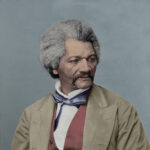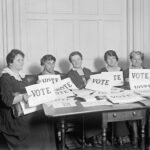Frederick Douglass Day is observed on February 14 to celebrate this author, publisher, writer, orator, and most prominent African American abolitionist of his time. Through his public presence, oration, and writing, Frederick Douglass inspired an entire generation of Black Americans to fight for their liberation. Born into slavery in Maryland, Douglass went on to become a lightning rod for abolition in America. His master’s wife made the mistake of teaching him how to read and write, which Frederick Douglass repaid in full by transforming himself into the antithesis of a slave. On his chosen day of birth, we celebrate one of the greatest leaders of America and take inspiration from his example.
History of Frederick Douglass Day
Frederick Douglass was born into slavery, on a farm in Talbot County, Maryland. He was raised by his grandmother, Betsey Bailey. His early years were spent on the plantation of Capt. Aaron Anthony, who was a clerk for Edward Lloyd, a wealthy slave owner based in Eastern Maryland. At age five, Colonel Lloyd took over Douglass and enslaved him at his plantation. A couple of years later, he was transferred to the Auld Family of Baltimore. Therein, Douglass took care of Thomas, the young son of Hugh and Sophia Auld. As Thomas came of age, Sophia Auld began teaching the alphabet to her son and Douglass. Teaching enslaved people how to read and write was forbidden in many slave states. Upon discovery, Hugh Auld instructed his wife to cease the lessons. According to his biography, Douglass once heard Hugh Auld say that literacy ‘spoils’ a slave.
Douglass kept up with his lessons by trading bread with poor white boys and rereading Thomas’ literary discards. The first turning point ushered in Douglass’ life when he was rented out to Edward Covey, a local Baltimore farmer. Covey was notoriously famous as a ‘Slave Breaker,’ for his harsh treatment of slaves. One day, in the middle of harsh beatings, Douglass struck a blow to Covey. The two men engaged in physical combat lasting two hours, and Douglass emerged victorious. Covey never touched him again, and Douglass learned a lesson in self-defense. Soon enough, Douglass started a Sabbath school for Black people. Douglass brought the revolution into his own life, starting by rejecting his enslaved name Frederick Augustus Washington Bailey. He escaped slavery in 1938. His sharp writing, extemporaneous speeches, and fearless demeanor quickly took everyone’s notice and made him a known name in abolitionist circles.
He made tremendous contributions to the cause of emancipation. His numerous writings, speeches, and public persona distinguished him as the face of the movement. On Frederick Douglass Day, we take the message of his teachings forward and pledge our lives in the fight against existing inequalities. He is celebrated as an advocate for education and a scholarship honoring him was established. If you’re looking for similar scholarships, head to Scholaroo for an extensive list of scholarships for Black students — pursuing education is a great way to celebrate Douglass’ achievements.
Frederick Douglass Day timeline
Frederick Douglass is born to Harriet Bailey, an enslaved Black woman in Maryland.
Frederick Douglass is sent to the Auld family, where he spends most of his formative years and learns to read and write.
Douglass enters into combat with Edward Covey, a white slave owner, and emerges victorious.
Douglass escapes the shackles of slavery, with the help of his then-girlfriend, Anna Murray, and settles in New York City.
Douglass travels to Ireland and cements an international rapport as the most eloquent African American of his time.
Douglass addresses a crowd in Rochester and gives his iconic speech, "What to the Slave is the Fourth of July?"
Frederick Douglass dies of a heart attack, shortly after attending a conference.
African American Activist Mary Church Terrell establishes February 14 as Frederick Douglass Day
Frederick Douglass Day FAQs
When is Frederick Douglass’s birthday?
Frederick Douglass was born into slavery and the exact year or date of his birth is not specified. He considered February 14 to be his birthday, because his mother used to call him ‘my little valentine.’
What is Frederick Douglass’ contribution to ending slavery?
Frederick Douglass was instrumental in spreading the abolitionist message across North America. Many people, including President Abraham Lincoln, were inspired by his oration.
Did Frederick Douglass believe in violence?
Frederick Douglass did not believe in violence as a way to end slavery. He maintained a pacifist view until the end. He believed education to be the biggest tool in the fight against slavery.
How to Observe Frederick Douglass Day
Speak up for the right cause
The fight for equality remains, as the challenges have changed their face but not their measure. On Frederick Douglass Day, raise your voice for the cause you believe in, and become the change you wish to see in the world.
Support your community
Douglass believed in the power of community and remained true to his people. Mark the day by lending a helping hand to someone in need, or standing up for the vulnerable in your community. Organize support groups, lead marches, and bring forth the power of unity.
Read his autobiography
“Narrative of the Life of Frederick Douglass, an American Slave” is one of the most famous accounts of a slave in history. This February, dedicate a day, or week, to the master of words, and indulge in the supreme command of Douglass’ narrative power
5 Lesser-Known Facts About Frederick Douglass
Born from a poem
Frederick rejected his enslaved name and adopted Douglas, which was inspired by "the Lady of the Lake," a poem by Sir Walter Scott.
A man with foresight
Douglass considered photography a tool for Black liberation and became the most photographed man of the 19th century.
The most unique presidential ticket
Douglass became the first-ever Black man to be nominated for the vice presidency, on a ticket with Victoria Woodhull, the first-ever female candidate for president.
The first male feminist
Douglass was an ardent supporter of the suffragette movement and was the only African American to attend women’s rights conferences in the mid-19th century.
A bestselling author
Frederick’s first autobiography became so successful that he feared its publicity would lead to his capture.
Why Frederick Douglass Day is Important
It recognizes the icon of abolition
Frederick Douglass’ contributions and teaching are underrepresented in the history of Black emancipation, which isn’t representative of the enormity of his role in raising awareness about abolition. On February 14, we get a chance to celebrate this icon and pass down his teachings to the younger generation.
It preaches the importance of education
Douglass resisted bloodshed and believed in moral suasion. He believed literacy was the biggest liberator of the enslaved, stating that “education makes a man unfit to be a slave." Frederick Douglass Day is a reminder of the importance of literacy in the liberation of the masses and there's even the Frederick Douglass Bicentennial Scholarship to honor him.
It inspires us to fight for ourselves
Numerous times in his writings, Frederick Douglass marks the day of his brawl with Edward Covey as a turning point in his life. He stood up for himself and changed the course of this country. Through the example of his life, we all can find inspiration to fight for ourselves and hope that we, too, can become instruments of a larger change.
Frederick Douglass Day dates
| Year | Date | Day |
|---|---|---|
| 2025 | February 14 | Friday |
| 2026 | February 14 | Saturday |
| 2027 | February 14 | Sunday |
| 2028 | February 14 | Monday |
| 2029 | February 14 | Wednesday |





































